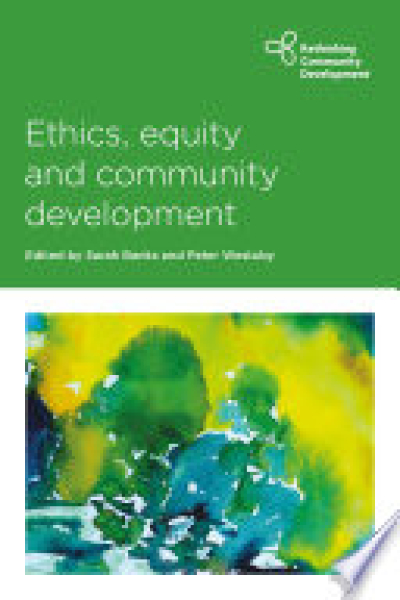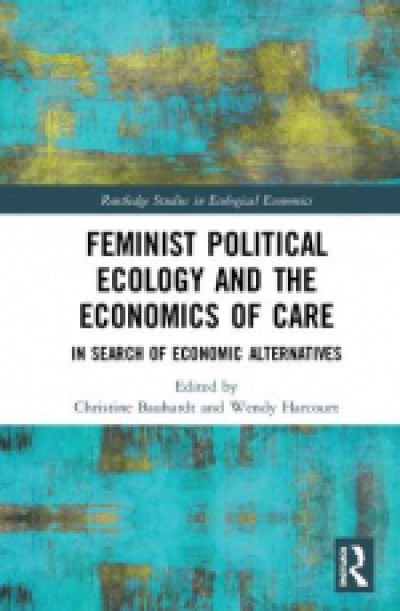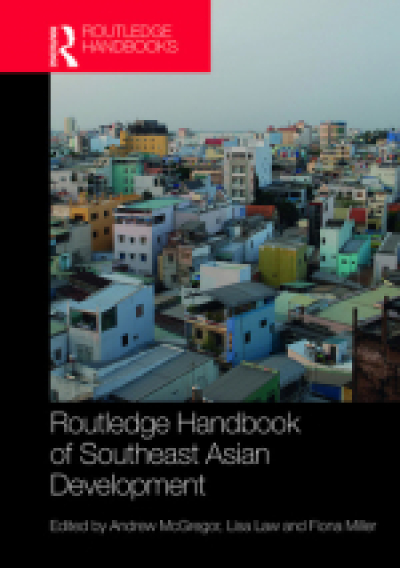I explore three sites that I was involved in commoning in a post-industrial working class neighbourhood in Montreal: a garden on a city-owned plot of land, a mural on a stock-corporation-owned viaduct and a community-owned industrial building “expropriated” from a capitalist developer after a 10-year grassroots campaign. In each of these sites new property relations were forged, ones where a commoning-community manages the space and benefits from how the space has been shaped. Each community is engaged in a continuous process of making and re-making as it is confronted with powerful forces that seek to enclose or uncommon the property it has taken responsibility for.
Chapters
Voici deux entrevues qui donnent à voir le portrait et le parcours de deux femmes anarchistes, l’une en France, l’autre au Québec.
Irène Pereira et Anna Kruzynski, qui ne se connaissent pas, tiennent des propos qui se font écho, en particulier quant à leur manière de mobiliser prudemment l’étiquette d’« anarchaféministe », même si elles ont plusieurs expériences dans des collectifs féministes. Aujourd’hui, elles s’intéressent et se préoccupent de toutes les formes de domination et cherchent à intégrer dans leur anarchisme des réflexions et des expériences d’ailleurs, par exemple des mouvements afro-américains, autochtones et latino-américains.
Collectively performed reciprocal labour involves a non-monetized exchange of group work done by community members for the benefit usually of one community member or household. In this chapter I shed light on the ubiquity of collectively performed reciprocal labour exchange, thereby establishing its legitimacy in a diverse economy.
This chapter in the Methodology Part VI of The Handbook of Diverse Economies discusses reading as a practice of knowledge production. It introduces 'critical reading' as a reading for dominance and lays out techniques of deconstruction and queering to show what reading for difference might entail.
In higher education, efforts to diversify the workforce and create a more inclusive and repre- sentative environment for students and employees have often been stymied by institutionalized racism, a lack of resources, and a lack of institutional energy. In this chapter I discuss an action research intervention, inspired by diverse economies scholarship, that was aimed at valuing and strengthening diversity and inclusion in a community college setting. A starting point for the project was the recognition that within the workplace there are multiple forms of work being performed, and associated ways of being, that fall outside of the traditional identity of a waged worker being paid for services rendered.
An introduction to Planning for Feminist and 2SLGBTQ+ Spaces. When I was a planning student in the late 1990’s, women activists contesting patriarchal city building with Women Plan Toronto (WPT) sparked my interest in planning for women and 2SLGBTQ communities. Throughout the 1980s and 1990s, WPT encouraged public sector planners and policy makers to plan women-friendly neighbourhoods that included accessible and affordable housing and public spaces and parks amenable to children, seniors and people with disabilities. WPT also advocated practical alternatives to address women’s planning concerns, including strategies for designing public transportation suitable for wheelchairs and strollers and ensuring women’s and children’s safety in urban design.
Modern-day mining is now highly mechanized and provides regular employment to highly paid workers in many parts of the world. However, there also exist millions of individuals who gain a livelihood from informal, artisanal and small-scale mining. From a diverse economies point of view, mining is as much non-capitalist as it is capitalist. The chapter aims to depart from the binary framing of informality and formality which situates informal mining labour only as ‘other’ to formal work in the capitalist mining industry. The author positions informal mining labour as part of the survival portfolio of poor and landless households to argue for a more dynamic view that opens up different possibilities for livelihood-making.
This chapter discusses how research can be part of a social action agenda to build new economies. This research is based on collaborations between researchers and research participants, and involves three interwoven strategies. The first focuses on developing new languages of economy; the second, on decentring economic subjectivity; and the third, on collective actions to consolidate and build economic initiatives. The chapter illustrates how these strategies feature in three research projects. The first project was based in the Philippines and involved working with an NGO and two municipalities to pilot pathways for endogenous economic development.
This chapter overviews the diverse economies framing of the enterprise, a framing that is founded on two distinguishing features. First there is the understanding of class as a process of producing, appropriating and distributing surplus labour; and second there is the use of a ‘weak theory’ perspective. What results is the recognition of enterprise diversity such that the economic landscape is populated with a range of non-capitalist, capitalist and more-than-capitalist enterprises. In this diversity there are enterprises that are producing, appropriating and distributing surplus labour in ways that take into the wellbeing of people and the planet.
The article focuses on free universities as grassroots responses to the crisis of universities worldwide, exemplifying how they contribute to the development of postcapitalist imaginaries in academia.
This chapter explores how geographic information systems (GIS) can be used in diverse economies research by first tracing how debates about GIS methods and associated epistemologies have changed since the 1980s. Although initially seen as a tool limited to quantitative spatial analysis, GIS has since expanded in scope to support and extend a variety of interpretivist modes of knowledge. Participatory, qualitative, and critical GIS emerged as some diverse ways to use GIS and spatial data. Scholars using a diverse economies approach participated in this expansion of the scope of GIS. Increasingly, the potential for GIS in diverse economies research is becoming more evident. This chapter discusses three ways that GIS can align with this framework.
A cursory examination of literature shows that religion and business are historically intertwined, with particular effects on society. Since the business/religion relationship is strongly driven by ethos, this relationship appears as an interesting and relevant issue in the case of social enterprises (hereafter SEs), which are value-driven initiatives. This chapter takes a look at the influence of religion on SEs in East Asia—the most religiously diverse region of the world. We start by analysing the influence of religion on international development discourse in recent decades, considering that major international development institutions have increasingly embraced SE as part of “sustainable development”.
Community Economy theory has gained much traction over the past two decades as a language politics and an ethical tool kit for researchers and practitioners in the field of community development. This chapter examines Community Economy approaches to development using two empirical examples from quite different contexts that highlight key ethical concerns. In the two empirical examples we show how communities can move towards surviving well collectively by mapping their existing diverse economic practices and relationships, and how people can shift from focusing on their individual survival to collective survival.

Creative arts-based methods and methodologies are, of recent, seeing a (re)surgence in human geography. Much less explored by geographers, however, are creative arts-based methods and methodologies as agents of sociopolitical change or as modalities overlapping with the intensifying work of place-based engagements by critical, racialized, queer, feminist, anti-colonial, Indigenous, differently-abled and/or activists, artists, and scholars. This paper provides a broad historical overview of creativity and arts practice in geography. It then interrogates some of the shortcomings of current scholarship about creativity (in practice and theory) in the discipline.
This is a revised and updated version of "Alternative Economies" first published in 2009 in the Elsevier Encyclopedia of Human Geography. The article draws on more recent diverse economies scholarship to illustrate a performative, as opposed to a realist, description of "alternativeness". Here alternative is understood in the context of the economy as an ontologically differentiated space, a space that is not organised by a singular logic, capitalist or otherwise. This has profound implications for the theory of change that informs diverse economies scholarly interventions.
In this era of human-induced environmental crisis, it is widely recognized that we need to foster better ways to sustain life for people and planet. For us – and other scholars drawing on the Community Economies tradition – better worlds begin in recognising the diverse and interconnected ways human communities secure our livelihoods. Community Economies scholarship is a body of theory that evolved from the writings of geographers J.K. Gibson-Graham, which, for more than thirty years, has inspired others (including the three of us) to rethink economy as a space of political possibility.

This essay reflects on two chapters on the theme of 'social entrepreneurship, relationality and the possible.' The essay explores how these chapters take a relational view of the world by featuring the importance of the relationships between people, and between people and ‘things’. What emerges from the two chapters are insights into social entrepreneurship as a social change practice not so much for finding accommodations in what is already present but for shifting the frame of what is thinkable and doable. The two chapters document strategies for social change while also recognising that social change is an unpredictable and uneven process that involves responding to the unexpected.
This book chapter outlines the basics of diverse economies and the idea of capitalocentrism for an audience in international political economy.
In this paper we use the concept of surviving well to reframe happiness.
Ce texte est un exercice de réflexion. Plutôt que de travailler avec des étiquettes idéologiques, j’ai envie de faire de la gymnastique mentale avec des concepts et des pratiques qui m’inspirent. Pour en arriver à proposer une méthode d’organisation qui soit porteuse d’espoir (un autre vivre ensemble est possible) tout en étant ancrée dans un pragmatisme mobilisateur. Je commencerai par expliciter mon point de vue sur l’exploitation et l’oppression des humains et de la nature. Puis, je reviendrai sur les idées mises de l’avant par Murray Bookchin et sur l’application de ses concepts d’écologie sociale et de municipalisme libertaire par le collectif anarchiste la Pointe libertaire. Ensuite j’aborderai les propositions de J. K.
Researchers have long recognized practices of mutual aid, reciprocity and sharing as prevalent features of everyday community life in Southeast Asia. Such practices are often represented as persistent vestiges of pre-capitalist societies and variously categorized as aspects of 'informal economies,' 'patron-client' relations or 'social capital.' In debates about capitalist development these 'relict' practices are seen as standing in the way of modern economic growth, as something to be overcome or enrolled into the mechanics of transition to market capitalism - that is, they are harnessed into a narrative of either decline or transcendence.

This chapter, written for the Thinking in the World Reader (Bloomsbury Press), seeks to challenge and think beyond a key blockage in contemporary life: the conventional distinction between economy and ecology. As we argue, the distinction between these two domains severs us from transformative, ethically-infused encounters with our constitutive interdependencies. We explore one possible way to affirm and expand the politicization of this interdependence: a notion of "ecological livelihoods" linked with an ethics and politics of commoning.
In 1980, R. W. Butler published his tourism area cycle of evolution model graphing a correlation of number of tourists on the y-axis and time on the x-axis. Although a location’s capacity for number of tourists and the specific number of sustainable years may vary from location to location, Butler proposed that every tourist location evolves through a common set of stages: exploration, involvement, development, consolidation, stagnation, and then some variation of rejuvenation or decline. Butler’s model frames the resources that enable a region to become a tourist destination as finite and ultimately exhaustible.
In the early 1990s, a group of housing activists from Washington, D.C. traveled to Johannesburg to help start the first housing cooperatives in South Africa’s history. These activists were from Washington Innercity Self Help, or WISH, a community-based group that directed much of its work towards helping low-income tenants purchase their buildings from their landlords and form limited-equity housing cooperatives – collectively owned housing that, because of restrictions placed on resale prices, would be affordable to poor people for years to come.
In this paper we use the concept of surviving well to reframe contemporary discussion of happiness and wellbeing in the context of international development discourse. While the attempts to move beyond metrics that privilege economic growth as the singular indicator of progress, it's equally true that our understanding of happiness and wellbeing needs to move beyond individual notions of contentment and towards a measure that allows people to thinking about their own needs in relation to others and in relation to planetary wellbeing.
Today the planet faces a genuine tragedy of the unmanaged “commons.” For decades an open access and unmanaged resource has been treated with the same sort of disregard as Hardin’s pasture was treated. The planet’s life-supporting atmosphere has been spoiled by “‘help yourself’ or ‘feel free’ attitudes” (Hardin 1998: 683). We are now faced with the seemingly impossible task of transforming an open access and unmanaged planetary resource into a commons which is managed and cared for. With the cause and impacts of global warming now beyond debate, we are being pressed to take responsibility and to act in new ways. But how are we to do this? What type of politics is called for?
In preparing for the talk associated with this paper I was invited to consider two things—the future of the arts in the era of austerity and restructuring and what the arts community might learn from the environmental movement. My thoughts on how to respond to this positioning is directed by my involvement with the Community Economies Collective (CEC) an international group of activist-scholars interested in enacting post-capitalist economies. And it is in this context that the concept of the Big Society provides us with an interesting point of departure.
